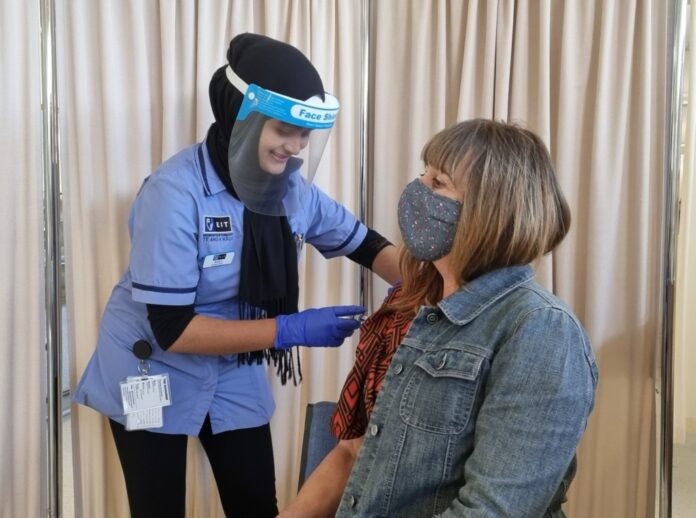Source: Eastern Institute of Technology – Tairāwhiti
5 mins ago
EIT Third Year nursing student Aalya Khatoon demonstrates the vaccination process with EIT Nurse Technician Linda Shaw.
EIT’s School of Nursing is playing a role at the frontline of the COVID-19 response after becoming one of the first tertiary providers in the country to have COVID-19 vaccinator training fully embedded in its degree programme.
In July last year, quick-thinking lecturers from EIT’s School of Nursing put the wheels in motion to respond to the pandemic when they incorporated vaccination training into the curriculum in anticipation of a licensed vaccine becoming available. In partnership with the Immunisation Advisory Centre (IMAC), Hawke’s Bay District Health Board (HBDHB), and general practices, EIT has since enrolled more than 100 third-year students into the provisional vaccination training programme.
This proactive approach is now starting to bear fruit as the School currently has 45 students who already hold provisional vaccinator authorisation, with many of them working at COVID-19 vaccination clinics across the region.
There are another 49 students in the process of completing the qualification, while past students who completed the training last year have since qualified as registered nurses and are also working at various vaccination clinics within the community.
Clare Buckley, Head of EIT’s School of Nursing, says the process has been a collaborative approach between EIT and local health organisations.
“The vaccinator training was added to the programme last year in recognition of the need that New Zealand would have once a vaccination was found and approved. EIT’s School of Nursing was getting ahead of the curve.”
“The School’s lecturers who teach the Primary Health Care course, Lizzy Mackenzie and Teresa Doran, were incredibly proactive and forward-thinking in embedding the vaccination training into the Bachelor of Nursing programme so early on.”
Clare says the two lecturers recognised that there would be a huge demand for vaccinators once a COVID-19 vaccine was found and approved.
“They worked very hard to ensure that EIT was doing everything it could to help to meet that demand and be responsive to the COVID-19 health response.”
Pre-pandemic only registered nurses and pharmacists with additional specialised training were authorised to administer vaccinations.
However, last year, IMAC, the nationwide organisation based at the School of Population Health at The University of Auckland responsible for providing vaccination training for health professionals, made their online training available to student nurses.
Clare says EIT was swift to respond, incorporating the training into the third year of the degree programme at the Hawkes’ Bay and Tairāwhiti campuses.
The road to becoming authorised COVID-19 vaccinators has not been easy, with the nursing students completing IMAC’s Provisional Vaccinator Foundation Course (PFVC), consolidating this with face-to-face training from the HBDHB’s immunisation team to help them hone their skills. They then had to exhibit their clinical competency through a peer assessment process facilitated by primary health care providers, enabling them to complete the final steps of their training and become authorised as provisional vaccinators.
In addition to the training, the students were also required to complete an advanced certificate in cardiopulmonary resuscitation (CPR), a prerequisite to becoming a vaccinator. The HBDHB delivered the CPR training at the Hawke’s Bay Campus in Taradale free of charge, removing cost barriers for the students.
“The work to embed the vaccinator training involved liaising with our Hawke’s Bay DHB colleagues and the Primary Healthcare Sector, and we absolutely acknowledge their support in making this work. Without the DHB facilitating the Level 4 CPR training, we could not have made it happen, so this really is different sectors, health and education, working together with just one aim in mind – improving the health of the tangata whenua of Hawke’s Bay.
“Embedding the vaccination training into the course also helps to ensure our graduates have work-ready skills that their future employers will see as a real advantage.” says Clare.



